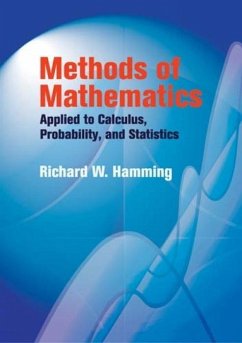R W Hamming
Methods of Mathematics Applied to Calculus, Probability, and Statistics
R W Hamming
Methods of Mathematics Applied to Calculus, Probability, and Statistics
- Broschiertes Buch
- Merkliste
- Auf die Merkliste
- Bewerten Bewerten
- Teilen
- Produkt teilen
- Produkterinnerung
- Produkterinnerung
This 4-part treatment begins with algebra and analytic geometry and proceeds to an exploration of the calculus of algebraic functions and transcendental functions and applications. 1985 edition. Includes 310 figures and 18 tables.
This 4-part treatment begins with algebra and analytic geometry and proceeds to an exploration of the calculus of algebraic functions and transcendental functions and applications. 1985 edition. Includes 310 figures and 18 tables.
Produktdetails
- Produktdetails
- Verlag: Dover Publications
- Seitenzahl: 857
- Erscheinungstermin: 30. November 2004
- Englisch
- Abmessung: 234mm x 166mm x 42mm
- Gewicht: 1175g
- ISBN-13: 9780486439457
- ISBN-10: 0486439453
- Artikelnr.: 21529309
- Herstellerkennzeichnung
- Libri GmbH
- Europaallee 1
- 36244 Bad Hersfeld
- gpsr@libri.de
- Verlag: Dover Publications
- Seitenzahl: 857
- Erscheinungstermin: 30. November 2004
- Englisch
- Abmessung: 234mm x 166mm x 42mm
- Gewicht: 1175g
- ISBN-13: 9780486439457
- ISBN-10: 0486439453
- Artikelnr.: 21529309
- Herstellerkennzeichnung
- Libri GmbH
- Europaallee 1
- 36244 Bad Hersfeld
- gpsr@libri.de
Richard W. Hamming: The Computer Icon Richard W. Hamming (1915-1998) was first a programmer of one of the earliest digital computers while assigned to the Manhattan Project in 1945, then for many years he worked at Bell Labs, and later at the Naval Postgraduate School in Monterey, California. He was a witty and iconoclastic mathematician and computer scientist whose work and influence still reverberates through the areas he was interested in and passionate about. Three of his long-lived books have been reprinted by Dover: Numerical Methods for Scientists and Engineers, 1987; Digital Filters, 1997; and Methods of Mathematics Applied to Calculus, Probability and Statistics, 2004. In the Author's Own Words: "The purpose of computing is insight, not numbers." "There are wavelengths that people cannot see, there are sounds that people cannot hear, and maybe computers have thoughts that people cannot think." "Whereas Newton could say, 'If I have seen a little farther than others, it is because I have stood on the shoulders of giants, I am forced to say, 'Today we stand on each other's feet.' Perhaps the central problem we face in all of computer science is how we are to get to the situation where we build on top of the work of others rather than redoing so much of it in a trivially different way." "If you don't work on important problems, it's not likely that you'll do important work." — Richard W. Hamming
Preface I. Algebra and Analytic Geometry 1. Prologue 2. The Integers 3.
Fractions-Rational Numbers 4. Real Numbers, Functions, and Philosophy 5.
Analytic Geometry. 6. Curves of Second Degree-Conics II. The Calculus of
Algebraic Functions 7. Derivatives in Geometry 8. Geometric Applications 9.
Nongeometric Applications 10. Functions of Several Variables 11.
Integration 12. Discrete Probability 13. Continuous Probability III. The
Transcendental Functions and Applications 14. The Logarithm Function 15.
The Exponential Function 16. The Trigonometric Functions 17. Formal
Integration 18. Applications Using One Independent Variable 19.
Applications Using Several Independent Variables IV. Miscellaneous Topics
20. Infinite Series 21. Applications of Infinite Series 22. Fourier Series
23. Differential Equations 24. Linear Differential Equations 25. Numerical
Methods 26. Epilogue Appendixes Answers to Some of the Exercises Index
Fractions-Rational Numbers 4. Real Numbers, Functions, and Philosophy 5.
Analytic Geometry. 6. Curves of Second Degree-Conics II. The Calculus of
Algebraic Functions 7. Derivatives in Geometry 8. Geometric Applications 9.
Nongeometric Applications 10. Functions of Several Variables 11.
Integration 12. Discrete Probability 13. Continuous Probability III. The
Transcendental Functions and Applications 14. The Logarithm Function 15.
The Exponential Function 16. The Trigonometric Functions 17. Formal
Integration 18. Applications Using One Independent Variable 19.
Applications Using Several Independent Variables IV. Miscellaneous Topics
20. Infinite Series 21. Applications of Infinite Series 22. Fourier Series
23. Differential Equations 24. Linear Differential Equations 25. Numerical
Methods 26. Epilogue Appendixes Answers to Some of the Exercises Index
Preface I. Algebra and Analytic Geometry 1. Prologue 2. The Integers 3.
Fractions-Rational Numbers 4. Real Numbers, Functions, and Philosophy 5.
Analytic Geometry. 6. Curves of Second Degree-Conics II. The Calculus of
Algebraic Functions 7. Derivatives in Geometry 8. Geometric Applications 9.
Nongeometric Applications 10. Functions of Several Variables 11.
Integration 12. Discrete Probability 13. Continuous Probability III. The
Transcendental Functions and Applications 14. The Logarithm Function 15.
The Exponential Function 16. The Trigonometric Functions 17. Formal
Integration 18. Applications Using One Independent Variable 19.
Applications Using Several Independent Variables IV. Miscellaneous Topics
20. Infinite Series 21. Applications of Infinite Series 22. Fourier Series
23. Differential Equations 24. Linear Differential Equations 25. Numerical
Methods 26. Epilogue Appendixes Answers to Some of the Exercises Index
Fractions-Rational Numbers 4. Real Numbers, Functions, and Philosophy 5.
Analytic Geometry. 6. Curves of Second Degree-Conics II. The Calculus of
Algebraic Functions 7. Derivatives in Geometry 8. Geometric Applications 9.
Nongeometric Applications 10. Functions of Several Variables 11.
Integration 12. Discrete Probability 13. Continuous Probability III. The
Transcendental Functions and Applications 14. The Logarithm Function 15.
The Exponential Function 16. The Trigonometric Functions 17. Formal
Integration 18. Applications Using One Independent Variable 19.
Applications Using Several Independent Variables IV. Miscellaneous Topics
20. Infinite Series 21. Applications of Infinite Series 22. Fourier Series
23. Differential Equations 24. Linear Differential Equations 25. Numerical
Methods 26. Epilogue Appendixes Answers to Some of the Exercises Index

